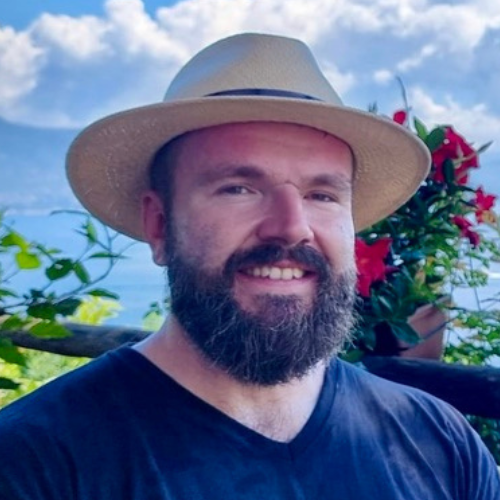Wherever you are, be all there.

"Wherever you are, be all there" is my second most meaningful core principle, coming right after "Subtraction beats addition every single time". This core principle has two dimensions:
- Focus on one thing instead of diluting attention to several different things.
- Be content with where you are, and avoid thoughts of all the places you could be.
Both dimensions are equally important: the first principle significantly increases your productivity and daily energy levels, and the second principle makes you a happier person.

Focus on one thing instead of diluting attention to several different things.
Focus is like the 101 core productivity rule you're probably aware of, but I would still like to bring this to mind again. We simply cannot focus on more than one thing at a time; we can only fool ourselves into thinking this is so.
I fall into this trap repeatedly and must consciously get out of it. It is even the case that I deliberately change things in my environment to prevent myself from working in parallel. Here are some examples:
- Business Meetings: Especially in times of online meetings, it is incredibly easy to think that you are in a meeting that doesn't need your full attention and that you can quickly take care of a few emails and little tasks on the side. Or even work on PowerPoint slides. And every time, I notice that I don't get anything from the meetings. My brain is not stupid, of course: it pays attention to specific triggers like my name, and I can then try to figure out what the question was from the last few scraps of words. This way, the mental absence might not be noticed, but the other participants and I don't get any added value from my meeting participation. This is gross nonsense and absolutely to be avoided! My counter hack is a habit I'm trying to introduce right now to put my Smartphone into offline mode while in meetings and to close all other Windows on my Desktop besides the Teams Meeting, PowerPoints and my notetaking tool.
- Leisure Time: Free time is scarce, so you quickly get the idea to parallelize the 1-2 hours you have in the evening. Why not read a book next to the movie? Why not chat and scroll on TikTok at the same time? And interact with your partner while doing that. The desire to use the little free time as effectively as possible is understandable, but more activities do not lead to more leisure pleasure (see my other article for more on that topic). On this point, I don't have a "hack" to avoid that. You must actively remind yourself to consciously spend your free time in a minimalistic and focused way to maximize pleasure. In my 20s, 1-2 beers every night were the go-to to calm the dynamic ideas in my head and focus on one thing, i.e. coming down from the day. Of course, this is not a sustainable solution (calories and health effects). Fortunately, I eventually realized that reading is the one I can entirely focus on without forcing myself to do it. Maybe you can find something similar in your leisure time toolbox?
- Social Chatting: This phenomenon no longer exists for me, as I no longer have much interest in social networking. However, I remember social chatting from my 20s as such an attention grabber that I would like to mention it here. At the time, one of my priorities as a student was to meet new people and expand my social circle. And, of course, to find a girlfriend. In my student days, it wasn't hard to find like-minded people, and the typical modus operandi at the time was chatting via Facebook Messenger or Whatsapp. I remember a friend with whom this went so far that we chatted virtually non-stop for the whole day. This led to a situation where I was more in the virtual conversation than in the real world. I was with my friends or family and mentally in the chat. I was at work and mentally in the chat. I was on vacation in the most beautiful landscapes and environments but mentally 2000km away, connected via this damn chat. You could say it was worth it, at least because my connection with this friend strengthened daily, chat by chat. But that is, interestingly enough, not the case. Digital chatting is a low-quality social interaction. It seems more like procrastination and entertainment than strengthening a relationship in retrospect. I.e. it was a total waste of time. What can be done about it? You need to shift your mindset to use chat and digital communication only for logistical arrangements, not as social interaction.
There is one exception where I strongly recommend parallelization to increase productivity: You can listen to music, podcasts, phone calls and audiobooks in combination with physical activities. For me, it's doing low-priority meetings while walking or driving by car. I love listening to podcasts while I exercise. I use proven music to help me concentrate better during complex tasks.

Be content with where you are, and avoid thoughts of all the places you could be.
Robert Greene writes in one of my favourite books, The Laws of Human Nature:
In all these cases, if we got closer to the people we envy, to that supposed happy family, to the other man or woman we covet, to the exotic natives in a culture we wish to know, to that better job, to that utopia, we would see through the illusion. And often when we act on these desires, we realize this in our disappointment, but it doesn’t change our behavior. The next object glittering in the distance, the next exotic cult or get-rich-quick scheme will inevitably seduce us. (link to book details)
I spent many years of my precious lifetime always wanting to be somewhere else than where I was:
- When I was out with one set of friends, I thought it could be more fun with another circle of friends right now instead.
- When I went to a party, I wondered if another event on the same night would not have been a better choice.
- When I was with my parents, I preferred to be with the girl I adored.
- When I was at work, I desired leisure time, and when I was in my free time, I felt terrible not doing my job.
- When I decided on a book and started to read it, my thoughts would immediately turn to whether I would be better off watching another book or movie instead to maximize my pleasure.
In sum, this is simply FOMO - the Fear Of Missing Out. People like me, who consciously choose a productivity-driven lifestyle, are particularly susceptible to this because they want to optimize everything, including where they are and what they are doing. There is always a residual doubt that one has not chosen the optimum.

This is a colossal mistake that significantly negatively affects the quality of life. In most cases, it is much better to stick with a decision once it has been consciously made, follow through with it, and mentally park all thoughts of alternatives. Why? It's because you usually can't change anything anyway when you are in the middle of your decision. If you try, you'll spend your whole life jumping from one shiny object to the next, and you won't be able to take full advantage of any of them.
There is also plenty of literature and research on this. In information theory, it is about Explore vs Exploit, and in mathematics about local and global optima in optimization problems (If this interests you more deeply, you could read the book Algorithms to live by).
However, I do not want to treat this topic academically here but rather anecdotally and with a simple recommendation. If you're affected by FOMO as I used to be, and you always want to be somewhere else, here's what you do: Train your ability to be where you are.
- Make conscious decisions about what you do. Once you have made such a conscious decision, stick to it, no matter what.
- When thoughts come to you, mentally put those thoughts in a box and put it on a mental backlog shelf. Accept the thought, this idea to do something different. Do not fight it. Just park it.
- However, if you get to a point where you are 100% sure you are in the wrong place for whatever reason and have made a bad decision, feel free to make the conscious decision to abort and thus avoid the sunk cost fallacy.
You see, this time, I don't have a shortcut mind hack, unfortunately. The trick is to train your serenity and mindfulness. This is rather like training focus through meditation.
But it's worth it because only with this strategy will you get to a point where you're just happy. With FOMO, you will only run after happiness like a Fata Morgana until one day you'll look back on your life and realize that you could have had satisfaction a long time ago and even without any effort if only you had been in the moment and not somewhere else.

Are you as interested as I am in living the most productive life possible? Then feel free subscribe to this blog's newsletter!

Discussion